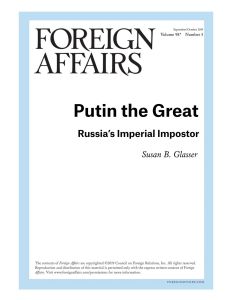Join getAbstract to access the summary!

Join getAbstract to access the summary!
Susan B. Glasser
Putin the Great
Russia’s Imperial Impostor
Foreign Affairs, 2019
What's inside?
The West has been misreading Putin for two decades.
auto-generated audio
1×
Log in to listen to the audio summary.
auto-generated audio
Recommendation
Russian President Vladimir Putin marks his 20th anniversary in power in 2019. Former Moscow co-bureau chief for the Washington Post, Susan B. Glasser, offers her assessment of Putin’s reign in an article in Foreign Affairs. Her explanation of Putin’s political thinking and the West’s failure to come to grips with it provides valuable context for anyone following international affairs.
Summary
About the Author
Susan B. Glasser is a staff writer for The New Yorker and former Moscow co-bureau chief for the Washington Post.
Learners who read this summary also read
Book
Book
Article
Book

















Comment on this summary